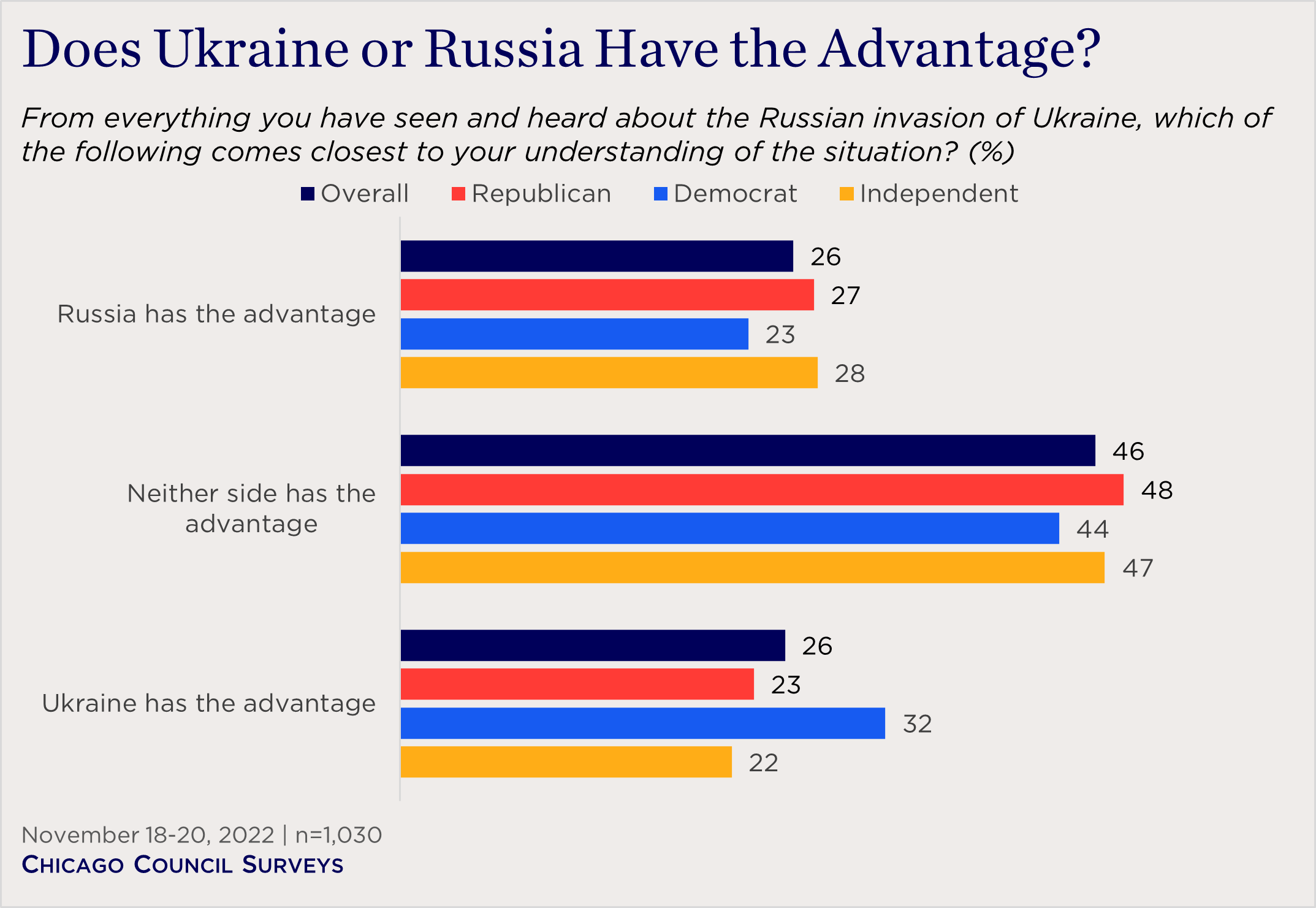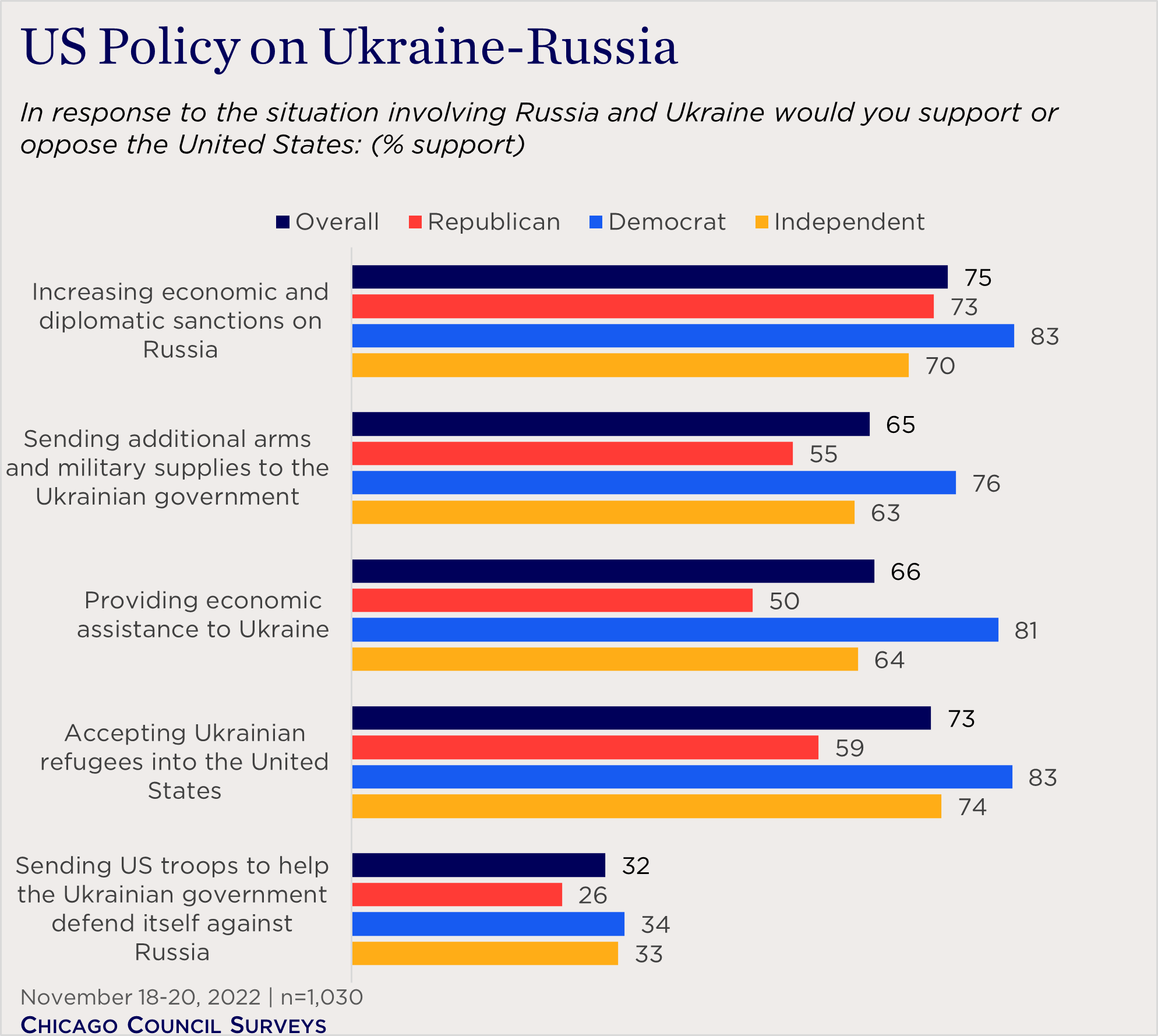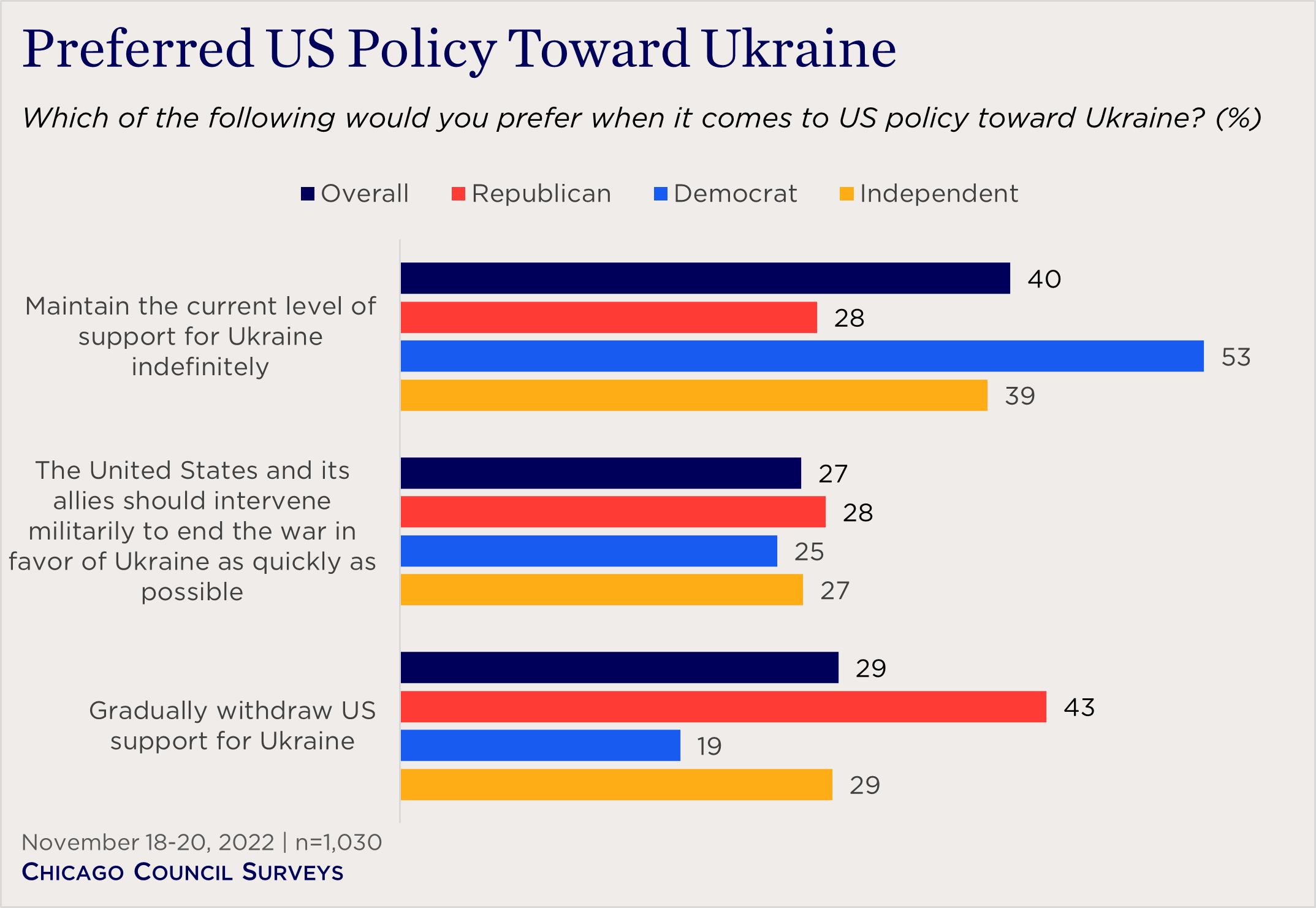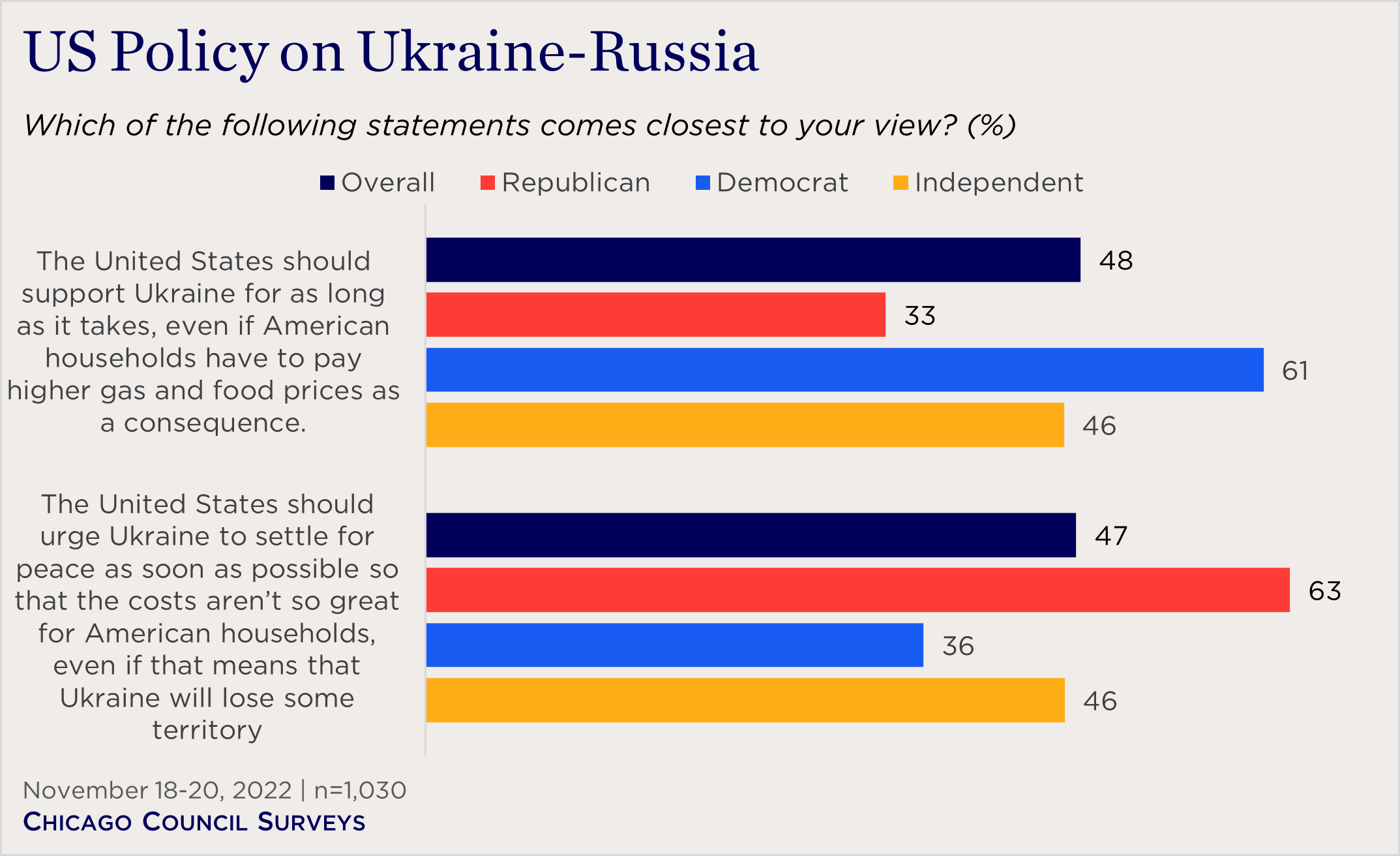Once again. . .it's MEDIA SPIN in the conclusion of a recent survey report:
"While Americans are divided on supporting Ukraine for as long as it
takes, support for the current US policies of assisting Kyiv
economically and militarily is still solid. The influence of perceptions
of which side is being successful on the battlefield illustrates the
important role that media spin can play in affecting public views about
the situation on the ground and, in turn, on continued backing for US
support to Ukraine." (See below)
✓ RESPONSIBLE STATECRAFT: "Pro-war bias
That lack of coverage is all the more stark in comparison to a hawkish think tank. The Center for Strategic and International Studies (CSIS), heavily funded by the US government, arms dealers and oil companies, is a consistently pro-war think tank: A FAIR investigation (Extra!, 10/16) of a year’s worth of CSIS op-eds and quotes in the New York Times failed to find any instance of the CSIS advocating for curtailment of US military policy.Ukraine hits targets deep inside Russia in break with Biden administration - Responsible Statecraft
Within 24 hours, Ukraine has used drones to attack several military targets inside Russia in a move that the Washington Post described as Kyiv’s “most brazen hit on Russian territory” since the war began.
After the first two strikes hit targets deep within Russia’s borders, a top Ukrainian official suggested in a cryptic tweet that the move was an inevitable result of the Kremlin’s continued assault. “[I]f something is launched into other countries’ airspace, sooner or later unknown flying objects will return to departure point,” wrote Mykhailo Podolyak, a top advisor to Ukrainian President Volodymyr Zelensky.
The United States has opposed Ukraine’s desire to hit targets within Russia since the war began, citing concerns about potential escalation. Given President Joe Biden’s strong stance, Kyiv promised Washington earlier this year that it would not strike Russian territory directly.
The Biden administration has also limited the types of weapons that it is willing to send to Ukraine, much to the chagrin of Kyiv’s most fervent supporters in Congress, who have long called on Biden to give Ukraine long-range missiles.
And new reporting indicates that the Pentagon has gone further than simply limiting the missiles and launchers that it sends to Kyiv. According to the Wall Street Journal, the Department of Defense quietly modified U.S.-made High Mobility Artillery Rocket Systems (HIMARS) such that they cannot launch long-range missiles before shipping them off to Ukraine.
The attacks “underscore the difficulty the Biden administration faces in trying to control the risks of escalation in this war,” according to George Beebe of the Quincy Institute.
“Despite our efforts to manage these risks, both the Russians and the Ukrainians can take actions that escalate the war in dangerous ways and increase the chances of a direct clash between the United States and Russia,” said Beebe, who previously led Russia analysis at the CIA.
The escalation comes as public support for a long-term war in Ukraine has started to slow. According to a new poll from the Chicago Council on Global Affairs, 47 percent of Americans think Washington “should urge Ukraine to settle for peace as soon as possible,” a nine point increase since July. Meanwhile, 48 percent of respondents, including most Democrats, argued that the United States “should support Ukraine for as long as it takes.”
TRENDING NEWS TODAY
NEW HAVEN, Conn. (AP) — A tart retort by Ukrainian President Volodymyr Zelenskyy to a U.S. offer of help and a call by former U.S. President Donald Trump for the “termination” of parts of the Constitution top a Yale Law School librarian’s list of the most notable quotations of 2022.
In February, only days after Russia invaded Ukraine, the U.S. offered to transport Zelenskyy to safety. That appeared not to sit well with him. “I need ammunition, not a ride,” he shot back, a senior American intelligence official with direct knowledge of the conversation told The Associated Press.
Hawkish experts dominate mainstream Ukraine coverage - Responsible Statecraft
"A crucial function of a free press is to present perspectives that
critically examine government actions. In major articles from the New York Times and the Wall Street Journal discussing
the escalation of the war in Ukraine, however, such perspectives have
been hard to come by—even as the stakes have reached as high as nuclear
war. . ." READ MORE
Nearly half of Americans (47%) now say Washington should urge Kyiv to settle for peace as soon as possible.
At the end of November, the United States authorized its latest assistance package to Ukraine, valued at $400 million to bolster the country’s security and defense in the war against Russia, now beginning its 10th month. A just-completed November 18-20 Chicago Council survey finds that large majorities of Americans continue to support US assistance to Ukraine, both economically and with military equipment. But as the fighting drags into winter, the overall US public is now divided on whether the United States should support Ukraine as long as it takes or if it should urge Kyiv to settle for peace as soon as possible.
Key Findings
- An equal percentage of Americans say Russia (26%) and Ukraine (26%) has the advantage in the current conflict. But a plurality (46%) believes that neither country has the advantage.
- Solid majorities of Americans continue to support supplying Ukraine with arms (65%) and economic aid (66%), accepting Ukrainian refugees (73%), and sanctioning Russia (75%).
- A plurality believes the United States should maintain its current level of support for Ukraine indefinitely (40%). Nearly three in 10 each say that the United States should intervene militarily to tip the advantage to Ukraine and end the war as soon as possible (27%)or that the United States should gradually withdraw support for Ukraine (29%).
- Separately, Americans are now closely divided on whether Washington should support Ukraine “as long as it takes” (48%, down from 58% in July 2022) or whether Washington should urge Ukraine to settle for peace as soon as possible (47%, up from 38% in July).
- Perceptions of who is winning have a great bearing on support for Kyiv.
Neither Ukraine nor Russia Seen as Having the Advantage
At the recent NATO summit of foreign ministers in Bucharest, NATO chief Jens Stoltenberg said Ukraine could expect further Russian attacks because “Russia is failing on the battlefield.” Ukrainian counteroffensives put Moscow on the back foot in some areas of the country.
But . The Chicago Council survey shows that as many Americans think Russia has the advantage in the current conflict as think Ukraine does (26% each). Democrats are more likely to say Ukraine has the advantage (32%, compared to 23% of Republicans and 22% of Independents). But an overall plurality (46%) believes that neither Ukraine nor Russia has the advantage.1

There are some hints that media sources could affect these views. For example, 26 percent of Americans who trust Fox News the most for accurate information say Ukraine has the advantage, compared to higher percentages of those who most trust MSNBC (48% say Ukraine has the advantage), NBC (36%), public television (33%), and CNN (32%).2
Perceptions of who is winning versus losing are important because they have a bearing on support for various policies. In an October University of Maryland poll, Americans who thought Ukraine was succeeding and Russia was losing were more willing to pay higher energy prices and tolerate increased inflation. There are similar relationships in the Council survey, as the following analysis illustrates.
Public Supports Existing US Policies on Ukraine
In addition to the $400 million defense package, US Secretary of State Antony Blinken announced $53 million in assistance to support Ukraine’s electrical system to help it recover from Russia’s bombardment of energy grid. Americans favor continued assistance to Ukraine, with majority support for supplying the country with arms (65%) and economic aid (66%), accepting its refugees (73%), and sanctioning Russia (75%).
But, Republican support for aid to Ukraine has declined notably over the course of the year. A smaller majority of Republicans now support the United States giving military aid (55%, down from 68% in July and 80% in March) and economic assistance (50%, down from 64% in July and 74% in March). Meanwhile, Democratic and Independent support for these policies has shown relatively little decline since March. One-third of Americans overall support sending US troops to Ukraine (32%, down from 38% in July) (see Appendix Figures A-E).

Those who sense that Ukraine has the advantage in the war support each of these policies at above average levels, with the exception of sending US troops to help Ukraine defend itself. Those who sense that Russia has the advantage are slightly more likely (36%) to support sending troops than those who think Ukraine (30%) or neither side (32%) has the edge in the conflict.
Americans Divide Along Party Lines on Approach to Ukraine Conflict
The Chicago Council survey tested American tolerance for continued support for Ukraine in various questions. When asked whether the United States should support Ukraine at current levels indefinitely, intervene militarily to decisively end the war, or gradually withdraw US support for Ukraine, a plurality prefers to continue the current levels of support indefinitely (40%). This is also the preferred approach for a narrow majority of Democrats (53%) and a plurality of Independents (39%). Republicans tend to prefer to gradually withdraw US support (43%).

Besides partisan identification, perceptions on who is thought to be winning the war are a key factor in these responses. A majority of those who think Ukraine has the advantage say the United States should continue the current level of assistance indefinitely (56%). On the other hand, those who think Russia has the advantage are more likely than others to prefer that the United States gradually withdraw its support for Ukraine (36%) or intervene militarily to bring the war to an end (33%).
Fewer Say United States Should Support Ukraine “As Long As It Takes”
A separate question asked in July and November finds that Americans are now divided over whether the United States should support Ukraine for as long as it takes or urge Kyiv to settle for peace. Half now (48%)—compared to 58 percent in July—say the United States should support Ukraine for as long as it takes, even if American households have to pay higher gas and food prices as a consequence. A similar proportion, 47 percent—up from 38 percent in July—say the United States should urge Ukraine to settle for peace as soon as possible so the costs aren’t so great for American households, even if that means Ukraine will lose some territory (Appendix Figure F).

Last July, the data revealed sharp partisan divisions on this question, with Republicans more split than Democrats in support (see Appendix Figure G). In the November reading, six in 10 Democrats (61%) continue to favor supporting Ukraine even at cost to the United States, down from seven in 10 last July (69%). Republican opinion, however, has shifted more dramatically. Today, only a third of Republicans (33%) say the United States should back Ukraine for as long as it takes, down from 50 percent this summer. Instead, a majority of Republicans favor pushing Ukraine to settle for peace to reduce costs to American households (63%, up from 46% in July 2022).
Corroborating the patterns above, a large majority of those who think Ukraine has the advantage in the current conflict say the United States should support Ukraine for as long as it takes (71% vs. 48% overall). By contrast, a majority of those who think Russia has the advantage think the United States should pressure Ukraine to settle for peace as soon as possible (60% vs. 47% overall).
Conclusion
While Americans are divided on supporting Ukraine for as long as it takes, support for the current US policies of assisting Kyiv economically and militarily is still solid. The influence of perceptions of which side is being successful on the battlefield illustrates the important role that media spin can play in affecting public views about the situation on the ground and, in turn, on continued backing for US support to Ukraine. "
RELATED CONTENT
Ukraine: Critical Issues - Ethics & International Affairs
Xc
.jpg)
.jpg)



No comments:
Post a Comment